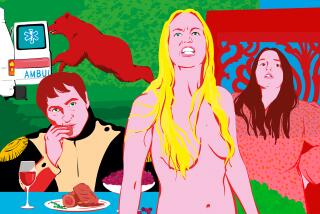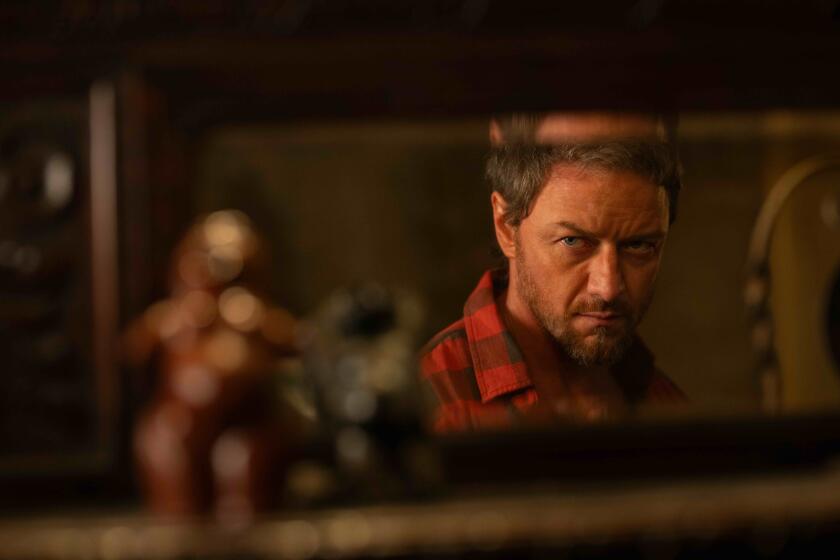Count on Johnny Depp to deliver eccentricity
“Eccentric” is not usually the first word used to describe a movie star’s galvanizing performance. “Sexy,” “tough,” “romantic,” “powerful,” “charismatic” are far more common. In fact, “eccentric” often has been a code word for unpredictability or downright weirdness -- not words associated with box office success in a blockbuster world.
But Johnny Depp has changed that this summer. His turn as Capt. Jack Sparrow in “Pirates of the Caribbean: The Curse of the Black Pearl” is, first and foremost, eccentric. Bedecked in a resplendent array of post-Carnaby Street glad rags, wearing heavy eye shadow, beaded long hair and a braided beard, he is certainly not the typically fierce and fearsome pirate of lore.
He isn’t romantic in any traditional sense, either; he weaves and tilts like an ambulatory bobblehead or a rock star on a high. (He has said Rolling Stone Keith Richards was a role model for the part, and his mellifluous voice is like David Bowie’s.) And Depp’s turn is not a clear-cut humorous performance, either. It’s just exotically different.
And that difference has played a key role in making Disney’s “Pirates” a massive hit -- more than $200 million in domestic gross revenue to date and going strong, with modest weekly declines and positive word-of-mouth ever since its July 9 opening. “I’m not sure how much credit I give him for opening the film -- he has not been the kind of actor who does that,” says Reagen Sulewski, analyst for the Box Office Prophets Web site. “That belongs to [producer] Jerry Bruckheimer. But in terms of carrying the film, he lifts it and carries it on his back.”
The effect of Depp’s portrayal -- commercially and culturally -- is a victory for mysterious eccentricity (a very human trait) over computer-generated special effects. But by making eccentricity hip (and a hit) for a mass audience, it has also raised questions about what constitutes an eccentric performance and, to paraphrase the late Supreme Court Justice Potter Stewart on pornography, how do you know it when you see it?
One clear way, it would seem, is if Depp is involved as an actor. At 40, he has been playing unusual and often quirky characters throughout his career, starting with his first major starring roles in John Waters’ “Cry-Baby” and Tim Burton’s “Edward Scissorhands.” He has brought a unifying element to his eccentric parts, according to Peter Bardazzi, director of new media at New York University. Depp offers a contemporary vision of “the third sex.” And in “Pirates,” he says, it has proved resonant.
“In ‘Pirates’ he’s a feminine influence, but not a gay one,” Bardazzi says. “He’s the only one in the film with eye makeup that’s outstanding, and he doesn’t have a relationship with a woman. And if you look at Depp’s film history, he played Ed Wood, and that character was a cross-dresser.”
Bardazzi wonders if, in “Pirates,” Depp has connected with a young audience (and maybe their nostalgic parents) in a way that recalls the impact of the longhaired, beaded male hippies of the 1960s. “It’s a kind of expression of something that’s not a traditionally male mold but also not female. Johnny Depp is a bohemian. He’s countercultural.”
Bruckheimer says he gave Depp leeway in determining his performance to a point. “You don’t hire Johnny Depp and not let him do what Johnny Depp does -- create characters,” he says. “He had something in his head he wanted to play, and I wanted him to do that. If I didn’t want him to create a character, I would have hired someone else.”
Eccentrics on the rise
Oddball performances of one sort or another are showing up more frequently in artier movies. Certain postmodern directors, such as Waters, the Coen brothers, David Lynch, Quentin Tarantino and Wes Anderson, seem to encourage wildly surreal, often menacing performances as a way to ironically undermine our complacency toward movie naturalism. It’s a way to be edgy. Lynch alone has given us Dennis Hopper and Dean Stockwell in “Blue Velvet,” Nicolas Cage in “Wild at Heart” and Robert Blake in “Lost Highway.” The Coen brothers’ “O Brother, Where Art Thou?” was nothing but such offbeat performances, even while poignantly evoking the “weird old America” (to use writer Greil Marcus’ term) of the past.
Should an eccentric performance be one that fits into the film’s general tone and vision, or should it conflict with it? If the former, two famous roles in Billy Wilder films -- Gloria Swanson’s haughty, reclusive actress in “Sunset Boulevard” and Tony Curtis’ flippantly irreverent, Cary Grant-like turn in “Some Like It Hot” -- would fit the bill.
Is it one that playfully spoofs our expectations of an actor’s existing image and past roles -- Humphrey Bogart in “Beat the Devil” or Marlon Brando in “The Freshman”? Or is that parody? Many of Brando’s characters are intentionally extraordinarily peculiar. So is he at his most genuinely eccentric when his character seems most ordinary, as was his therapist opposite Depp in 1995’s “Don Juan DeMarco”?
“To me, an eccentric performance goes against the grain of a movie and becomes a movie in itself,” says Dennis Bartok, head of programming at Hollywood’s American Cinematheque. “Sometimes it becomes so great in and of itself that it becomes more interesting than the movie.”
He singles out Val Kilmer’s “sly and fey” interpretation of the tubercular Doc Holliday in 1993’s “Tombstone” as an intentionally eccentric performance. And he sees Tony Bennett’s Hymie Kelly, the Jewish-Irish pal of Stephen Boyd’s actor Frankie Fane in 1966’s “The Oscar,” as a perhaps unintentional one: “He rushes into every scene like a linebacker carrying a football.”
Bardazzi tends to share that view and cites Donald Sutherland’s intentionally contemporary (for its time) portrayal of Sgt. Oddball, the tank commander in 1970’s World War II caper film “Kelly’s Heroes,” as another example of an actor choosing to give his character an over-the-top eccentricity that seems to stand apart from the movie he’s in. He also gives an example of an actor who is never eccentric: Tom Hanks. “Even when he plays a gangster, he’s all-American.”
But other definitions of eccentricity are more expansive. “Eccentric acting means character acting,” explains Lorinne Vozoff, artistic director of L.A.’s Theatre Group Studio, which teaches Method acting. “All it means is you grab a hold of something and use it.”
She sees it as a way an actor fights predictability and resists becoming pigeonholed. “There’s an enormous difference between being a movie star and being an actor,” she says. “Once you’re a movie star, they want to slide you into a slot and do that certain kind of role again.”
She considers Maggie Smith’s performance as the spoiled aunt in “Gosford Park” a quintessential eccentric performance. And she cites Edward Norton as an exemplary actor who always justifies his characters’ eccentricities in their personalities.
Ultimately, Bardazzi gives this definition of a great eccentric performance: “It transcends what it’s supposed to be.” He believes Depp reaches that transcendent level in “Pirates” because “he remains human although you can’t identify him with any recognizable human out there.” Maybe that’s why everyone seems to love him this summer, when movies seem so predictable.
More to Read
Only good movies
Get the Indie Focus newsletter, Mark Olsen's weekly guide to the world of cinema.
You may occasionally receive promotional content from the Los Angeles Times.









